The invention of the internet shook the world.
The feeling of having the world available at a click was nothing less than magical.
But the advent of internet wasn’t complete until social media sites stepped in and changed the way we communicate with each other.
Whatsapp has replaced telephone calls, coffee chats have morphed into Skype calls, and talking about personal feelings has turned into Facebook statuses.
In some ways, social media has brought us closer to each other. Long forgotten friends can be found again after one rigorous search on Facebook. Our opinions can reach a wider audience through Twitter. In fact, our artistic abilities have found an abode in our Instagram feed.
Facebook has 1.71 billion active monthly users as per statistics of the second quarter of 2016. In fact, social networking has become the #1 online activity in the U.S followed by email.

Internet has hijacked our life and confined it within the walls manufactured by comments, likes and followers. Human life has become dependent on status updates and marking those events as ‘interested’ that they will never attend anyway. Internet and social media sites are ruling us in numerous ways, and we have become robots that are relying on these social sites for our daily dose of validation and maintaining a social life.
But is this the future of our relationships? Can we lead a healthy and happy life by simply relying on Internet and online friends for meeting our emotional and mental needs? Of course not.
1. The curious case of the Dunbar Number
Dunbar number is defined as the maximum stable relationships a person can maintain in his lifetime. As per Robin Dunbar, the maximum number of friends a human can have is 150. But a Facebook user has an average of 338 friends online. Now, the question arises: How many of them are your real friends?
As per a study at Oxford University, only four of our Facebook friends are real, irrespective of the number of users who are gleaming under the ‘Friends’ section of our Facebook account. It means almost all of your so-called Facebook friends are fake.

Fake friends are like shadows: always near you at your brightest moments, but nowhere to be seen at your darkest hour. True friends are like stars, you don't always see them but they are always there.
90% of UK Facebook users receive a ‘friend request’ from a stranger. Around 51% of them accept those friend requests and add them as their friends on Facebook. How stable are the online relationship when friendship is not determined by the mutual likes, dislikes and interests, but simply by clicking an ‘accept’ button if you want to be someone’s friend?
307 million UK citizens use Facebook.
What is the lure of social networks that is causing us to stay so active in the world of virtual reality that we are neglecting our real life and real ties? The reasons are revealed in a survey by The Atlantic. One of the top reasons for using Facebook is to keep a tab on our friends’ activities and to stay updated.
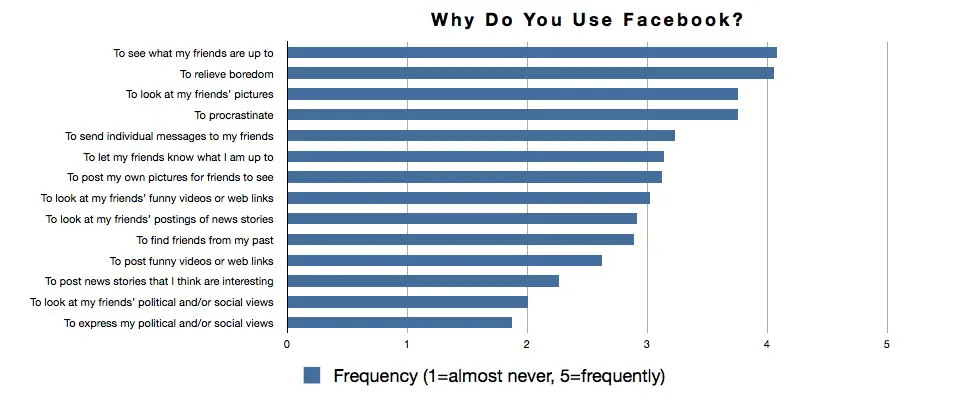
Facebook and Twitter have become top platforms to stay in touch with online friends. Around 64% teenagers meet a new friend through these social media sites. Social media has become a new way to widen our social circle.
2. Real life friends versus online friends – Is there any difference?
Real life friends offer a kind of intimacy that online friends fail to give. Real friends not only know about your likes and dislikes, but they have experienced all the good and the bad times along with you, unlike your online friends who can offer sympathies only after you update a sad status.
Physical presence is really important in any kind of relationship, as nothing can beat a consoling hug, human warmth and the security of having someone by your side when you are going through life.
The number of friends online is two times more that real life friends.
Body language plays a big role in the human connection. It is missing in an online connection. It can mislead us since we cannot see the other person physically. That is why one has to be really careful while making new friends on the internet.
Connection with people has reduced to status updates and likes. These tiny buttons dictate how strong our friendship is with numerous people. In fact, if you don’t like a friend’s status or picture, it becomes the evidence of your disloyalty towards them.
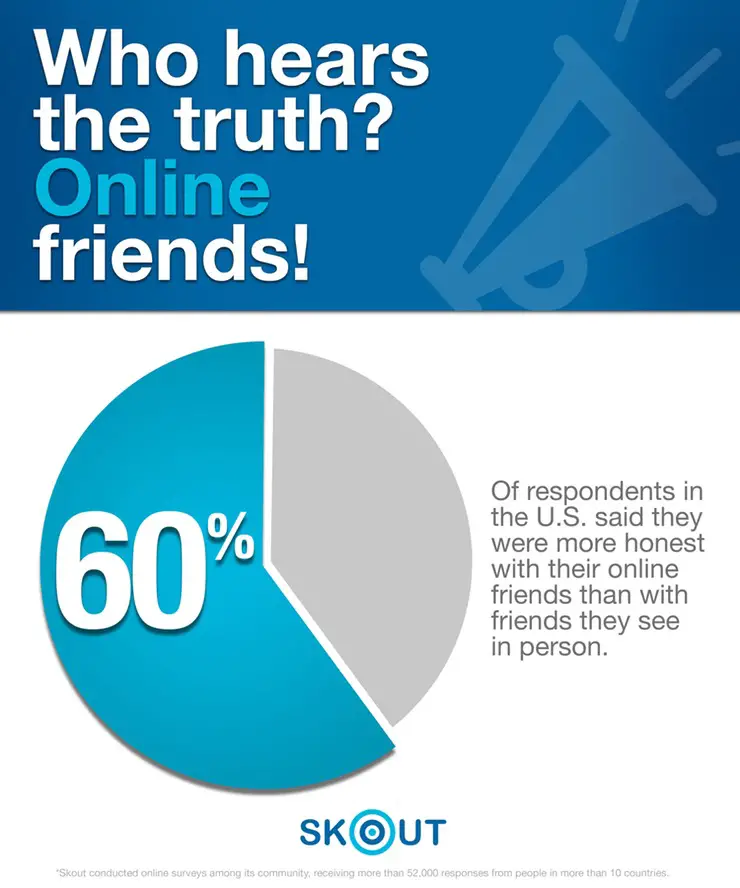
In every one minute, 510 comments are made, 2,93,000 statuses and 1,36,000 photos are posted on Facebook. It’s an insane amount of activity. From posting a status about our lunch meal at KFC to sharing a sad status hinting at our latest breakup, we keep our online friends updated about every tiny event going on in our life. But how many of them care to know about our 14-year-old dog who recently died? Not many.

The more time we spend interconnected via a myriad of devices, the less time we have left to develop true friendships in the real world.
The truth is, online friendship has replaced emotional honesty that comes along with real friendships.
Around 56% of U.S. women have a close online friend even if they have not met them once in their life, whereas around 44% of the guys also have the same.
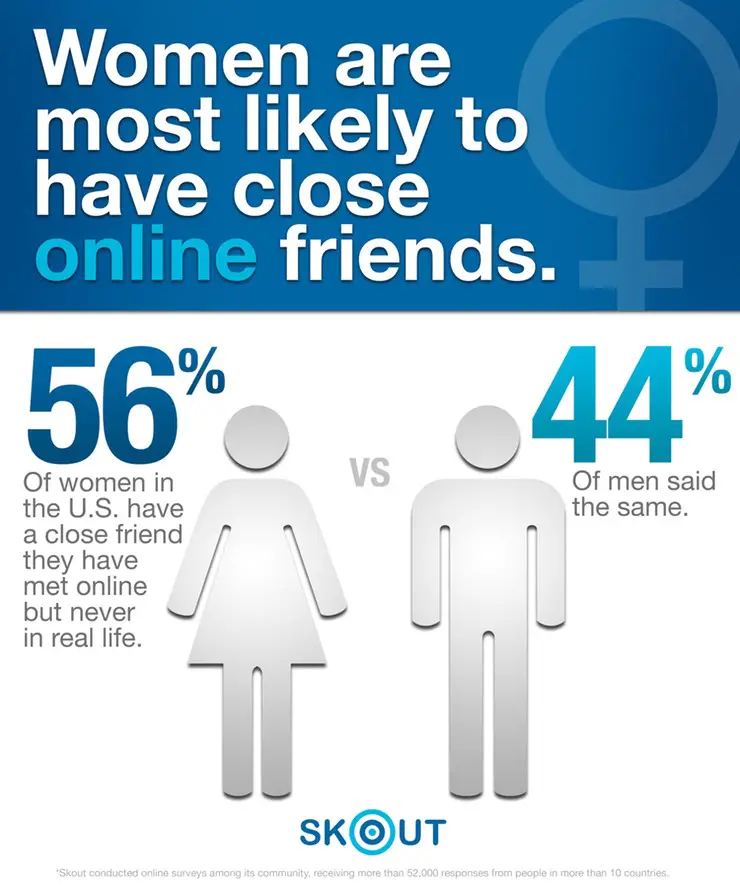
3. Transitioning to the digital age
How many of us have pretended to be on our phones while standing somewhere alone just to make it seem like we are busy?
It is a very common practice, almost a reflex action, but why do we do that?
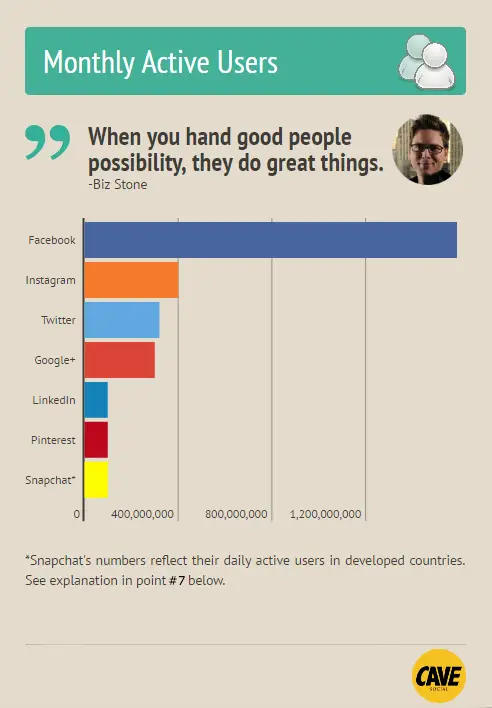
The reason is simple. Having your eyes fixated on the glowing screens of our cell phones has become a way to prove that we have got a social life. We are living in a generation where our popularity is measured on the basis of how many friends like our pictures.
Facebook is the leading source of socialization for people, with Instagram being the second and Twitter coming at third place. As new social sites are coming into the market, more and more people are getting engaged in making a permanent residence in virtual reality.

Tess realized one of the great modern dating sadnesses: everyone is so used to the comforting glow of the computer screen that no one can go so far as to say "good morning" in public without being liquored up.
Instagram has around 400 million active users. It is filled with pictures of cats, dogs, food and of course, selfies. Instagram has led to an upsurge of models who post numerous photos on Instagram on a daily basis. Social media has turned into a competition to prove your worth. It has put an immense pressure on young people to have the perfect hair and flawless contouring.
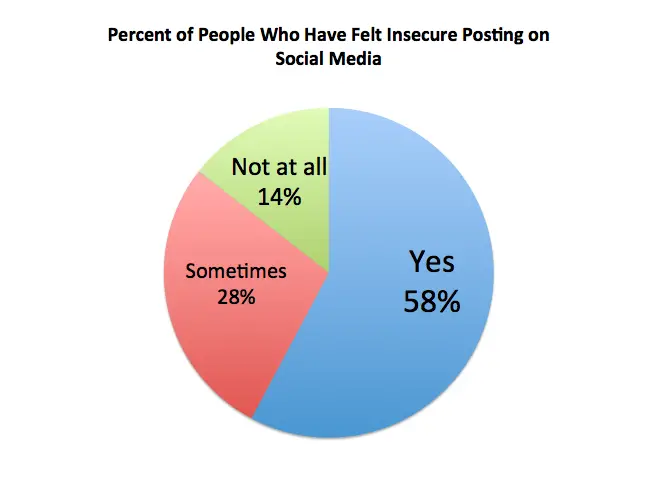
Moreover, there is a rush to prove that your life is better by posting pictures of the latest parties you’ve attended, the new place you have visited and the expensive wine you’ve just tried.
It has become the major source of depression for many people. It is not only impossible to compete with someone’s seemingly perfect life, but there is extreme stress regarding how you should portray your own life. It causes people to feel insecure while posting anything on social media.
Social media has caused depression and anxiety among many users. 53% of the UK citizens who were surveyed accepted that social media brought a change in their behaviour while 51% agreed that the change was negative.
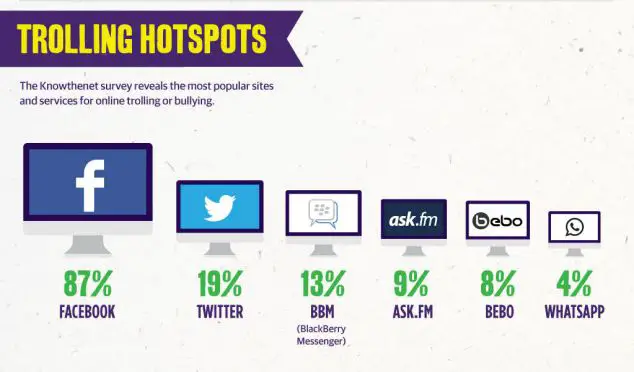
Internet is brimming with trolls, fake profiles and bullies. Almost all of us have been victims of cyber bullying or trolling in one way or the other. With Facebook at the top, every social media site has become a hotspot for bullies and trolls.
83 million Facebook profiles are not real.
4. Match made in virtual reality
It is so easy to maintain relationships these days, as no real efforts are needed. All you have to do is send a ‘good morning’ and ‘goodnight’ text, post some statuses showing how much you love your partner and tag them in some lovey-dovey pictures. But is it really intimacy or a bogus way to stay single while being committed?

If you would be loved, love, and be loveable.
Traditional romance requires efforts from both the parties. Candle light dinners, late night conversations under stars and cooking breakfast together used to be the ways to express one’s undying love towards another.
But meetings have turned into late night Skyping and gifts have morphed into posting videos.
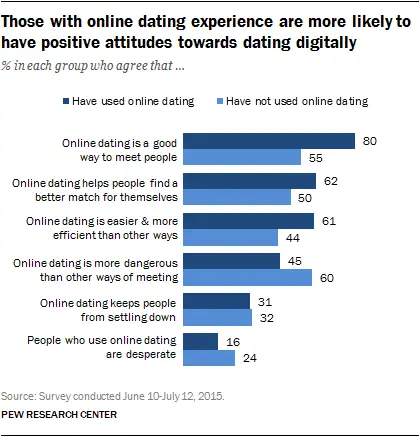
People have given up the old way of meeting new people as potential partners and have moved to online dating in order to find someone compatible.
Although the people who have experienced online dating have a generally positive feeling towards it.
But is it safe to assume that the person you are chatting with, is portraying their real self? They might say the sweetest words and treat you perfectly, but how can you be sure that they are authentic enough to go and meet them in real life?
As per an online survey by SurveyMonkey, 33% people have portrayed themselves differently when online.
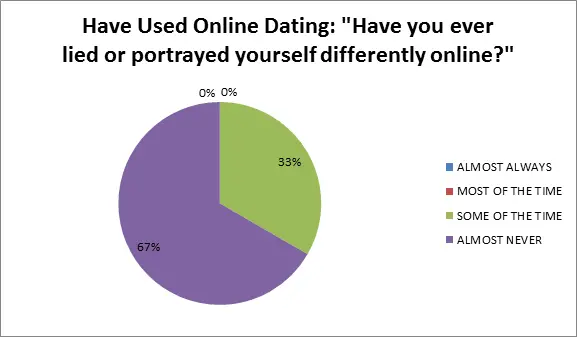
In fact, many people in India have joined dating sites simply to pursue casual dating or friendship, and not a serious, long-term relationship.
Is it wise to rely on dating sites and other social networking sites in order to pursue a serious relationship with the expectation of getting married at some point? As per the statistics, it doesn’t look like a really wise decision.
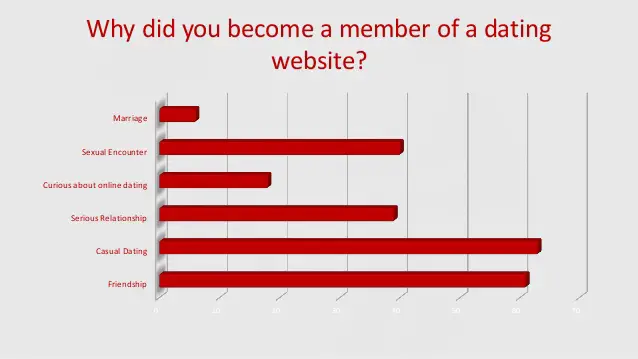
But everything is not as black and white, as 9.4% Americans among those who were surveyed met their life partner on online dating sites or other social media sites.
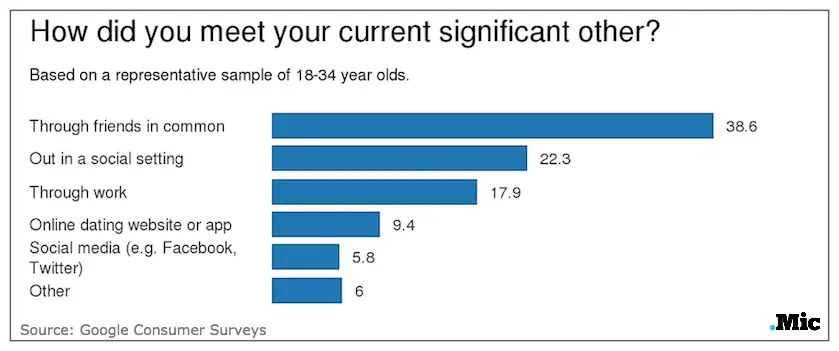
When you are pursuing a relationship in real life, there are responsibilities. They are not simply confined to sending texts. You learn to manage your own feelings and emotions while understanding another person. An argument or fight is generally resolved by having a discussion.
There is not much chance of ‘discussion’ online, as the reader cannot understand the context of the message you have sent, and they can misinterpret it in any way they want. It often leads to an escalation of conflicts which generally ends up with blocking the person.
16.67% men have ghosted to end a relationship.
‘Blocking a person’ is an easy way out, as all it takes is just a click to throw someone out of your life. In this way, a relationship has lost its meaning in this quick-makeup-quick-breakup era.
5. Balance is the key – Manage offline life and online life together
It is important to not neglect the value of real life interactions, relationships and intimacy. There is no substitute for them. It is healthy to maintain some online links that can help you personally as well as professionally, but you cannot depend your entire life on these online alternatives.
10% UK citizens don’t have a close friend. It means that a person should start building more relationships in the real world. Try to find people with similar interests at parties, libraries, science clubs and other places you can visit. Make efforts to go out with them and have fun in real life. You can always rely on some of your online friends for emotional support, but nothing can beat a good hug and spoken words of encouragement.

I see a world on the edge of a blade. Without balance, it will fall.
An average person spends around 2 hours 51 minutes online every day. This time can be used to learn a new language or instrument, exploring new places or doing social work. Some time can be spent on the internet, but it should not be at the cost of neglecting your personal development.
Conclusion
It is time to shut down your laptops and switch off your cell phones to step outside the world of virtual reality where everything is regulated by numbers.
You must learn to appreciate the world beyond the mundane pictures and updates. There is a lot to see and a lot to experience. But how many of us can say it boldly that we have seen and experienced everything and that’s why we are spending the rest of our time online?
The Internet has become an addiction.
It is no less than opium, heroin or cocaine. People cannot sustain without an internet connection anymore, and they need to stay connected 24/7 in order to feel alive—just like a drug user. It is time to give up our addiction and to embrace life as it is meant to be.
Spend some quality time with your loved ones, go out to a restaurant with friends, sit with your partner and have a long chat and then if there is some time left, open your internet browser gladly.
Are you ready to transform your life by stepping away from virtual reality?
